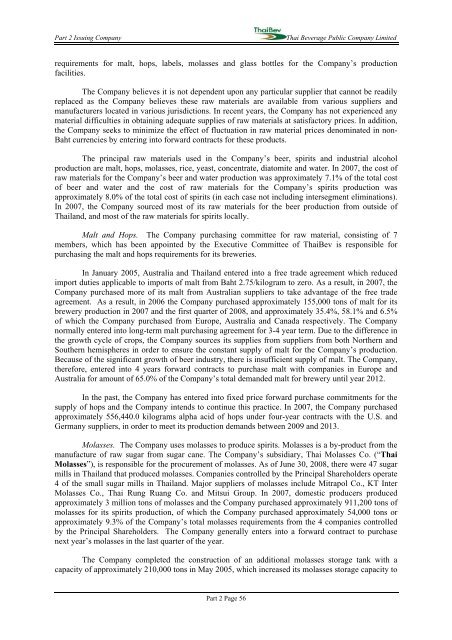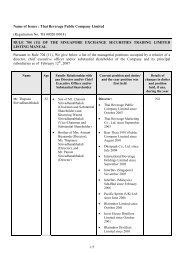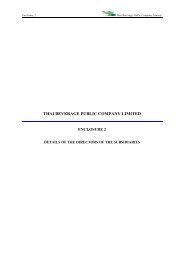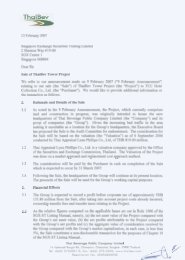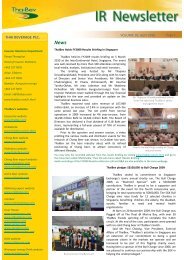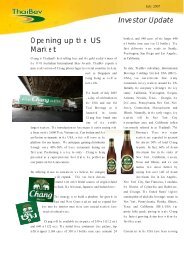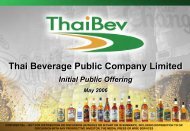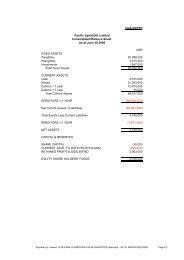PROSPECTUS THAI BEVERAGE PUBLIC COMPANY LIMITED ...
PROSPECTUS THAI BEVERAGE PUBLIC COMPANY LIMITED ...
PROSPECTUS THAI BEVERAGE PUBLIC COMPANY LIMITED ...
You also want an ePaper? Increase the reach of your titles
YUMPU automatically turns print PDFs into web optimized ePapers that Google loves.
Part 2 Issuing CompanyThai Beverage Public Company Limitedrequirements for malt, hops, labels, molasses and glass bottles for the Company’s productionfacilities.The Company believes it is not dependent upon any particular supplier that cannot be readilyreplaced as the Company believes these raw materials are available from various suppliers andmanufacturers located in various jurisdictions. In recent years, the Company has not experienced anymaterial difficulties in obtaining adequate supplies of raw materials at satisfactory prices. In addition,the Company seeks to minimize the effect of fluctuation in raw material prices denominated in non-Baht currencies by entering into forward contracts for these products.The principal raw materials used in the Company’s beer, spirits and industrial alcoholproduction are malt, hops, molasses, rice, yeast, concentrate, diatomite and water. In 2007, the cost ofraw materials for the Company’s beer and water production was approximately 7.1% of the total costof beer and water and the cost of raw materials for the Company’s spirits production wasapproximately 8.0% of the total cost of spirits (in each case not including intersegment eliminations).In 2007, the Company sourced most of its raw materials for the beer production from outside ofThailand, and most of the raw materials for spirits locally.Malt and Hops. The Company purchasing committee for raw material, consisting of 7members, which has been appointed by the Executive Committee of ThaiBev is responsible forpurchasing the malt and hops requirements for its breweries.In January 2005, Australia and Thailand entered into a free trade agreement which reducedimport duties applicable to imports of malt from Baht 2.75/kilogram to zero. As a result, in 2007, theCompany purchased more of its malt from Australian suppliers to take advantage of the free tradeagreement. As a result, in 2006 the Company purchased approximately 155,000 tons of malt for itsbrewery production in 2007 and the first quarter of 2008, and approximately 35.4%, 58.1% and 6.5%of which the Company purchased from Europe, Australia and Canada respectively. The Companynormally entered into long-term malt purchasing agreement for 3-4 year term. Due to the difference inthe growth cycle of crops, the Company sources its supplies from suppliers from both Northern andSouthern hemispheres in order to ensure the constant supply of malt for the Company’s production.Because of the significant growth of beer industry, there is insufficient supply of malt. The Company,therefore, entered into 4 years forward contracts to purchase malt with companies in Europe andAustralia for amount of 65.0% of the Company’s total demanded malt for brewery until year 2012.In the past, the Company has entered into fixed price forward purchase commitments for thesupply of hops and the Company intends to continue this practice. In 2007, the Company purchasedapproximately 556,440.0 kilograms alpha acid of hops under four-year contracts with the U.S. andGermany suppliers, in order to meet its production demands between 2009 and 2013.Molasses. The Company uses molasses to produce spirits. Molasses is a by-product from themanufacture of raw sugar from sugar cane. The Company’s subsidiary, Thai Molasses Co. (“ThaiMolasses”), is responsible for the procurement of molasses. As of June 30, 2008, there were 47 sugarmills in Thailand that produced molasses. Companies controlled by the Principal Shareholders operate4 of the small sugar mills in Thailand. Major suppliers of molasses include Mitrapol Co., KT InterMolasses Co., Thai Rung Ruang Co. and Mitsui Group. In 2007, domestic producers producedapproximately 3 million tons of molasses and the Company purchased approximately 911,200 tons ofmolasses for its spirits production, of which the Company purchased approximately 54,000 tons orapproximately 9.3% of the Company’s total molasses requirements from the 4 companies controlledby the Principal Shareholders. The Company generally enters into a forward contract to purchasenext year’s molasses in the last quarter of the year.The Company completed the construction of an additional molasses storage tank with acapacity of approximately 210,000 tons in May 2005, which increased its molasses storage capacity toPart 2 Page 56


